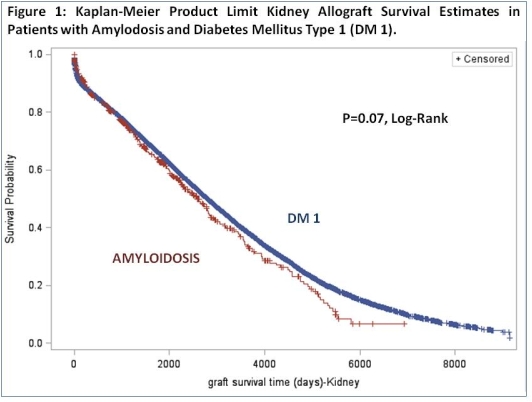Kidney Transplant Outcomes in Patients With Amyloidosis
Kidney and Pancreas Transplant Program, MedStar Georgetown Transplant Institute, Georgetown University School of Medicine, Washington, DC.
Meeting: 2015 American Transplant Congress
Abstract number: B131
Keywords: Graft failure, Graft survival, Kidney transplantation, Outcome
Session Information
Session Name: Poster Session B: Kidney Complications: Late Graft Failure
Session Type: Poster Session
Date: Sunday, May 3, 2015
Session Time: 5:30pm-6:30pm
 Presentation Time: 5:30pm-6:30pm
Presentation Time: 5:30pm-6:30pm
Location: Exhibit Hall E
Objective: Analyze kidney allograft outcomes in patients with kidney failure due to amyloidosis, and compare kidney transplant survival to patients with other causes of kidney failure.
Methods: We reviewed the UNOS dataset for patients who underwent first kidney transplant between 10/01/1987 and 3/31/2013. We used Student's t-test to compare means, Chi-Square statistic for comparisons between nominal distributions and the Kaplan-Meier product limit method to estimate kidney allograft survival probabilities. Graft survival was compared for patients with kidney failure attributed to amyloidosis, diabetes mellitus type 1, polycystic kidney disease, and hypertension.
Results: We identified 536 patients who underwent a kidney transplant with kidney failure attributed to amyloidosis. Graft survival for patients with amyloidosis was inferior to patients with kidney failure due to hypertension and polycystic kidney disease (p<0.01, log-rank) but comparable to patients with diabetes mellitus type 1 (p=0.07, log-rank). Patient with amyloidosis were older with a mean age of 54.6 +/- 11.1 years compared to patients with diabetes mellitus who had a mean age of 42.7+/-10.6 years at transplantation (p<0.01), and were more likely to undergo a live donor kidney transplant accounting for 43.7% (n=234) of all transplants compared to 35.5% of transplants from live donors in patients with DM-1 (p<0.01). 
Conclusions: In the US national kidney transplant cohort, allograft survival for patients with kidney failure due to amylodosis was inferior to patients with kidney failure due to hypertension or polycystic kidney disease, but comparable to patients with kidney failure due to diabetes mellitus type 1, a higher risk patient sub-group based on post-transplant outcomes. Based on these data, realistic expectations can be set for patients with amyloidosis with the hope of satisfactory post-transplant outcomes.
To cite this abstract in AMA style:
Verbesey J, Cooper M, Weems P, Gilbert A, Grafals M, Nilubol C, Moore J, Ghasemian S, Javaid B. Kidney Transplant Outcomes in Patients With Amyloidosis [abstract]. Am J Transplant. 2015; 15 (suppl 3). https://atcmeetingabstracts.com/abstract/kidney-transplant-outcomes-in-patients-with-amyloidosis/. Accessed February 16, 2026.« Back to 2015 American Transplant Congress
